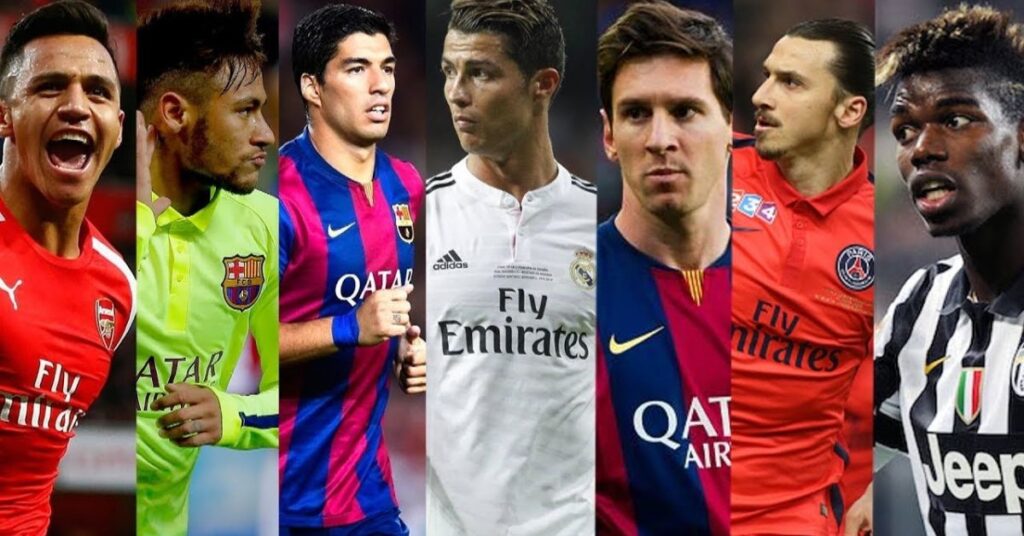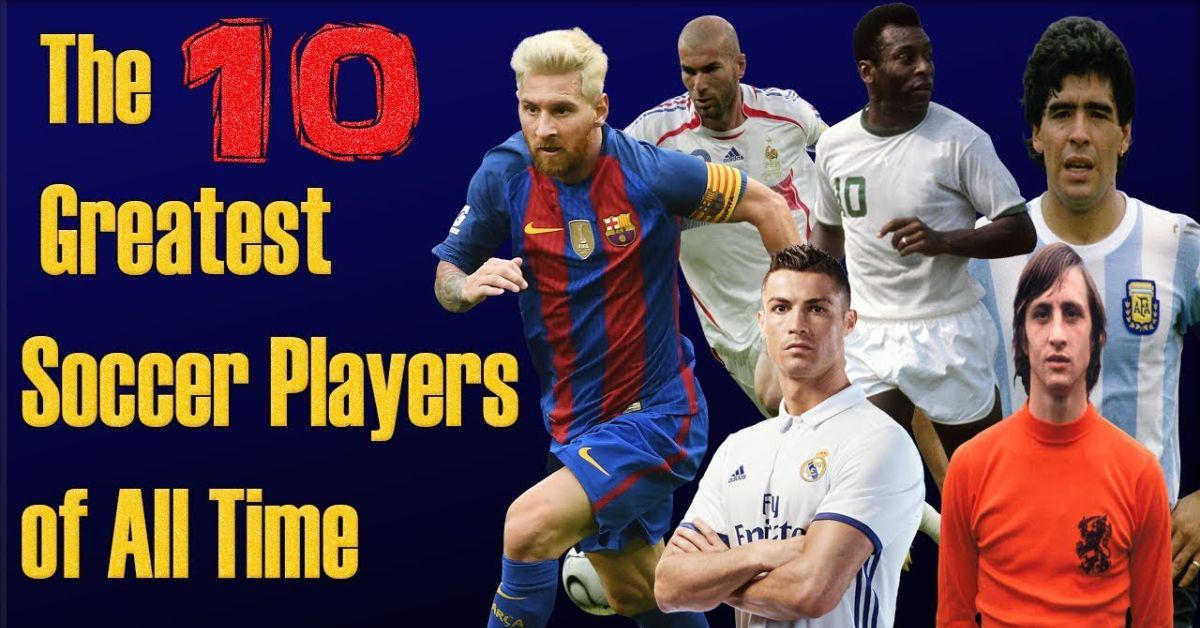When you think about the greatest athletes in sports history, the realm of soccer (or football, as it’s known worldwide) stands apart. The beautiful game has given us moments of pure magic, unforgettable victories, and players whose skills seemed to defy physics. Today, we’re diving deep into the stories of the Top 10 Best Soccer Players of All Time who’ve graced the pitch, exploring what made them exceptional and why their impact still resonates today.
Key Takeaways
- The greatest soccer players transformed how we understand the sport
- Success at both club and international levels played a crucial role in rankings
- Individual brilliance combined with team achievements defines true greatness
- Modern technology helps us appreciate historical players’ impacts
- Evolution of playing styles shows through these legends’ careers
How We Ranked These Soccer Legends

Before diving into our list, let’s break down the methodology behind these rankings. We’ve considered multiple factors:
| Criteria | Weight | Description |
| Individual Awards | 25% | Ballon d’Or, Golden Boot, etc. |
| Team Success | 25% | World Cup, Champions League, League titles |
| Innovation | 20% | Tactical influence and style evolution |
| Consistency | 15% | Performance over career length |
| Big Game Impact | 15% | Performance in crucial matches |
#1 Lionel Messi: The Magical Maestro
When discussing Lionel Messi, statistics alone don’t capture his genius. Standing at just 5’7″, he transformed his supposed physical disadvantage into his greatest weapon. His low center of gravity, combined with otherworldly ball control, enables him to change direction at speeds that leave defenders grasping at shadows. At Barcelona, Messi redefined the false-9 position, dropping deep to collect the ball before wreaking havoc through the middle.
His seven Ballon d’Or awards tell only part of the story. In La Liga, Messi’s numbers border on the absurd: 474 goals and 192 assists in 520 games. He’s not just a scorer but a master playmaker, leading both goals and assists charts in multiple seasons. His Champions League performances produced countless iconic moments, including that unforgettable solo goal against Real Madrid where he dribbled past five defenders.
The crowning achievement came in the 2022 World Cup, where he led Argentina to victory with performances that seemed written for Hollywood. Throughout the tournament, Messi demonstrated why he’s considered the most complete player ever – scoring, creating, and leading his team with a determination that transformed him from a club legend to an immortal of the sport.
#2 Pelé: Soccer’s Original GOAT
Pelé emerged like a comet in the 1958 World Cup, a 17-year-old who played with the maturity of a veteran and the joy of a child. His impact on soccer transcended mere statistics, though those are mind-boggling enough: 1,279 goals in 1,363 games, a record that may never be broken. At Santos, he transformed a regional Brazilian club into a global powerhouse, refusing numerous offers from European giants to stay loyal to his home team.
His three World Cup victories (1958, 1962, and 1970) showcase his longevity and ability to adapt his game. The 1970 tournament, in particular, displayed Pelé at his peak – the dummy against Uruguay, the pass without looking against Italy, and the iconic header in the final against Italy remain etched in soccer history.
What set Pelé apart wasn’t just his scoring ability but his completeness as a player. He could dribble like a winger, pass like a midfielder, and finish like a striker. His physical prowess combined with technical skill created a template for the modern complete forward. Even his stint with the New York Cosmos helped popularize soccer in America, showing his impact extended far beyond the field.
#3 Diego Maradona: The Hand of God and Feet of Gold
Diego Maradona‘s story reads like a Greek tragedy – a player blessed with unnatural talent who carried the hopes of millions on his shoulders. His defining moment came in the 1986 World Cup, where he single-handedly (sometimes literally) led Argentina to victory. The quarter-final against England encapsulated his genius and controversy: the “Hand of God” goal showing his cunning, followed by the “Goal of the Century” displaying his unmatched skill.
At Napoli, Maradona achieved what seemed impossible, leading an unfancied team to two Serie A titles against the mighty northern Italian clubs. His impact on Naples went beyond soccer – he became a cultural icon, a symbol of the south’s resistance against the industrial north. His dribbling ability seemed to defy physics; he could turn on a dime, accelerate past defenders, and maintain perfect control while running at full speed.
What made Maradona special wasn’t just his skill but his leadership and ability to elevate his teammates. He played with a passion that infected everyone around him, turning good players into great ones through sheer force of will. His personal demons may have cut his career short, but at his peak, he produced moments of magic that redefined what was possible on a soccer field.
#4 Cristiano Ronaldo: The Ultimate Competitor
Cristiano Ronaldo‘s transformation from a tricky winger at Sporting CP to one of soccer’s greatest ever goalscorers is a testament to relentless ambition and work ethic. His success across the Premier League, La Liga, and Serie A demonstrates an unmatched adaptability. At Real Madrid, he redefined the meaning of consistency, averaging over a goal per game across nine seasons.
His five Ballon d’Or awards reflect his individual brilliance, but it’s his Champions League record that truly sets him apart. Ronaldo’s 140 goals in the competition, including crucial knockout stage performances, earned him the nickname “Mr. Champions League.” His athletic prowess revolutionized what’s expected of modern forwards – combining explosive speed with incredible aerial ability and shooting power from any angle.
What’s often overlooked is Ronaldo’s tactical intelligence. He’s constantly evolved his game, transitioning from a dribbling wizard to an aerial threat, and finally to an elite poacher. His preparation and professionalism set new standards for athlete conditioning. Even in his late 30s, he continues to break records, proving that his greatest competition has always been himself.
#5 Johan Cruyff: The Thinking Man’s Genius
Johan Cruyff wasn’t just a player; he was a revolutionary who changed how we think about soccer. At Ajax, he became the poster boy for Total Football, a tactical approach that required players to be comfortable in any position on the field. The “Cruyff Turn,” his signature move, symbolized his innovative thinking – simple yet devastatingly effective.
His three consecutive Ballon d’Or awards (1971-1974) coincided with Ajax’s European dominance, where they won three straight European Cups. Cruyff’s influence extended beyond his playing achievements. His vision of soccer as a spatial game, where the intelligent use of space was more important than physical attributes, laid the foundation for modern possession-based soccer.
At Barcelona, he didn’t just excel as a player but planted the philosophical seeds that would later bloom into their tiki-taka style. His understanding of soccer was so profound that his ideas continue to influence the sport decades later. The Ajax and Barcelona academies still follow his principles of technical skill, positional fluidity, and intelligent movement.
#6 Franz Beckenbauer: Der Kaiser’s Revolutionary Reign
Franz Beckenbauer earned his nickname “Der Kaiser” through a combination of elegant play and natural leadership that transformed defensive soccer. As the pioneer of the libero or sweeper position, he revolutionized how defenders could influence the game. At Bayern Munich, he led the team to three consecutive European Cup victories, showcasing that defenders could be as crucial to attacking play as forwards.
His crowning achievement came in the 1974 World Cup, where he captained West Germany to victory while implementing a modern, flexible playing style. Beckenbauer’s ability to read the game and step into midfield with the ball created a new template for defensive players. He showed that defenders didn’t just need to destroy attacks but could initiate them too.
What set Beckenbauer apart was his complete mastery of the game’s tactical aspects. He could orchestrate play from deep positions, timing his forays forward perfectly while never compromising his defensive duties. His success as both player and coach (winning the World Cup in both roles) demonstrates his deep understanding of soccer’s strategic elements.
#7 Alfredo Di Stéfano: The Complete Footballer
Alfredo Di Stéfano was soccer’s first truly complete player, excelling in every outfield position during his career. At Real Madrid, he became the driving force behind their five consecutive European Cup victories, scoring in each final – a record that may never be broken. His understanding of space and movement was decades ahead of his time.
What made Di Stéfano special was his ability to influence every aspect of the game. He would defend like a center-back, create like a midfielder, and finish like a striker – often all in the same match. His stamina and work rate were legendary; teammates often spoke of how he seemed to be everywhere on the field at once.
His impact on Real Madrid transformed them from a strong Spanish club into the world’s most successful team. Di Stéfano’s tactical flexibility and complete skill set made him impossible to mark and even harder to play against. He could control games in a way that no player before him had managed, making him soccer’s first modern superstar.
#8 Michel Platini: The Elegant Orchestrator
Michel Platini represented the perfect blend of artistic flair and clinical efficiency. His peak years at Juventus coincided with his three consecutive Ballon d’Or wins (1983-1985), during which he dominated European soccer with a style that combined elegant playmaking with prolific scoring.
His finest hour came in the 1984 European Championship, where he led France to victory with nine goals in five matches – a record that still stands. Platini’s free-kick technique was revolutionary; he could bend the ball with minimal backspin, creating dipping shots that goalkeepers found impossible to read.
What set Platini apart was his extraordinary game intelligence. He seemed to play in slow motion, always finding time and space where none seemed to exist. His ability to arrive late in the box and score crucial goals while also being his team’s primary creator made him unique among midfielders of his era. His vision and passing range redefined what was possible from an attacking midfielder.
#9 Zinedine Zidane: The Artist of the Beautiful Game
Zinedine Zidane played soccer like a choreographed dance, combining physical grace with technical perfection. His control of the ball was so precise that he could receive and pass it in the same motion, even under intense pressure. His defining moment came in the 1998 World Cup final, scoring twice to lead France to victory on home soil.
At Real Madrid, Zidane’s elegance reached its peak. His winning volley in the 2002 Champions League final stands as perhaps the most beautiful goal ever scored in a European final. What made Zidane special wasn’t just his technique but his ability to produce his best performances in the biggest matches.
His understanding of space and timing was unmatched; he could control the tempo of a game single-handedly. Even in physical battles, Zidane’s technical skill and strength allowed him to protect the ball while waiting for the perfect moment to strike. His roulette move became iconic, symbolizing the perfect marriage of functionality and beauty in soccer.
#10 Ronaldo (Brazilian): O Fenômeno
Before knee injuries altered his career, Ronaldo was the most complete striker ever seen in soccer. His combination of explosive speed, power, and technical skill made him virtually unstoppable. At PSV, Barcelona, and Inter Milan, he scored goals that seemed impossible, combining the finesse of a ballet dancer with the power of a bulldozer.
His comeback from career-threatening injuries to lead Brazil to the 2002 World Cup victory stands as one of sport’s greatest redemption stories. Eight goals in the tournament, including two in the final, proved that even at reduced physical capacity, his soccer intelligence and finishing ability remained unmatched.
What made Ronaldo special was his ability to combine physical dominance with technical excellence. He could outpace defenders, outmuscle them, or simply dribble past them – often all in the same move. His signature move, the step-over, became a template for future generations of strikers. Even after losing some of his explosive pace, he adapted his game to remain one of soccer’s most lethal finishers.
Frequently Asked Questions
Who is the king of football all time top 10?
Pelé is widely considered the king of football, though Lionel Messi‘s recent World Cup victory has strengthened his claim to this title. The top 10 typically includes legends like Maradona, Cruyff, and Beckenbauer.
Who is the best soccer man?
Currently, Lionel Messi is widely regarded as the best soccer player of all time, having won seven Ballon d’Or awards and the 2022 World Cup. His achievements at both club and international level set him apart.
Who is the most famous footballer?
Cristiano Ronaldo is currently the most famous footballer globally, with over 600 million Instagram followers. His global brand and career achievements have made him a household name worldwide.
Who is the no. 1 richest footballer in the world?
A: As of 2024, Cristiano Ronaldo is the richest footballer in the world, with a net worth estimated at $500 million, largely due to his Al Nassr contract and numerous business ventures.
Who is richer, CR7 or Messi?
Cristiano Ronaldo is currently richer than Messi, with a higher net worth thanks to his lucrative Saudi Arabia contract and more diverse business portfolio.
Who is the youngest billionaire footballer?
No active footballer has reached billionaire status yet in terms of net worth. However, Kylian Mbappé is on track to potentially become the youngest, given his massive PSG contract and endorsements.
Who is better, Messi or Ronaldo?
While both are exceptional, Lionel Messi is generally considered better by most experts and fellow professionals, especially after winning the World Cup to complement his superior individual awards.
How rich is Ronaldo in 2024?
Cristiano Ronaldo‘s net worth in 2024 is estimated at $500 million, with an annual salary of around $200 million from Al Nassr and additional income from endorsements.
Who is the highest paid footballer?
Cristiano Ronaldo is currently the highest-paid footballer, earning approximately $200 million per year at Al Nassr in Saudi Arabia, surpassing all other players’ salaries.
Who is the richest footballer still playing?
Cristiano Ronaldo is the richest active footballer, followed by Lionel Messi and Neymar Jr. His Al Nassr contract makes him the highest-earning athlete in team sports.
Conclusion:
The debate over the top 10 best soccer players of all time reveals the beautiful game’s rich history and evolving nature. From Lionel Messi‘s supernatural ball control to Pelé‘s revolutionary impact, each legend has left an indelible mark on the sport. Diego Maradona‘s artistic genius and Cristiano Ronaldo‘s relentless pursuit of excellence showcase different paths to greatness.
Johan Cruyff‘s Total Football philosophy and Franz Beckenbauer‘s defensive innovation demonstrate how these legends didn’t just play the game – they transformed it. Alfredo Di Stéfano‘s complete skill set laid the groundwork for modern versatile players, while Michel Platini‘s midfield mastery showed how one player could orchestrate an entire team’s success.
Zinedine Zidane‘s elegant style and big-game performances proved that soccer can be both effective and beautiful, while the Brazilian Ronaldo‘s explosive talent reminded us that even brief periods of dominance can leave lasting legacies.
These ten giants of the game represent more than just individual brilliance – they embody soccer’s evolution from a simple sport to a global cultural phenomenon. Their contributions continue to inspire new generations of players, proving that true greatness in soccer isn’t just about statistics and trophies, but about changing how we understand and appreciate the beautiful game.
More Posts

CrestSphere.com is your go-to platform for curated knowledge, insights, and tools across diverse niches, empowering users with expert content, resources, and innovative solutions.
